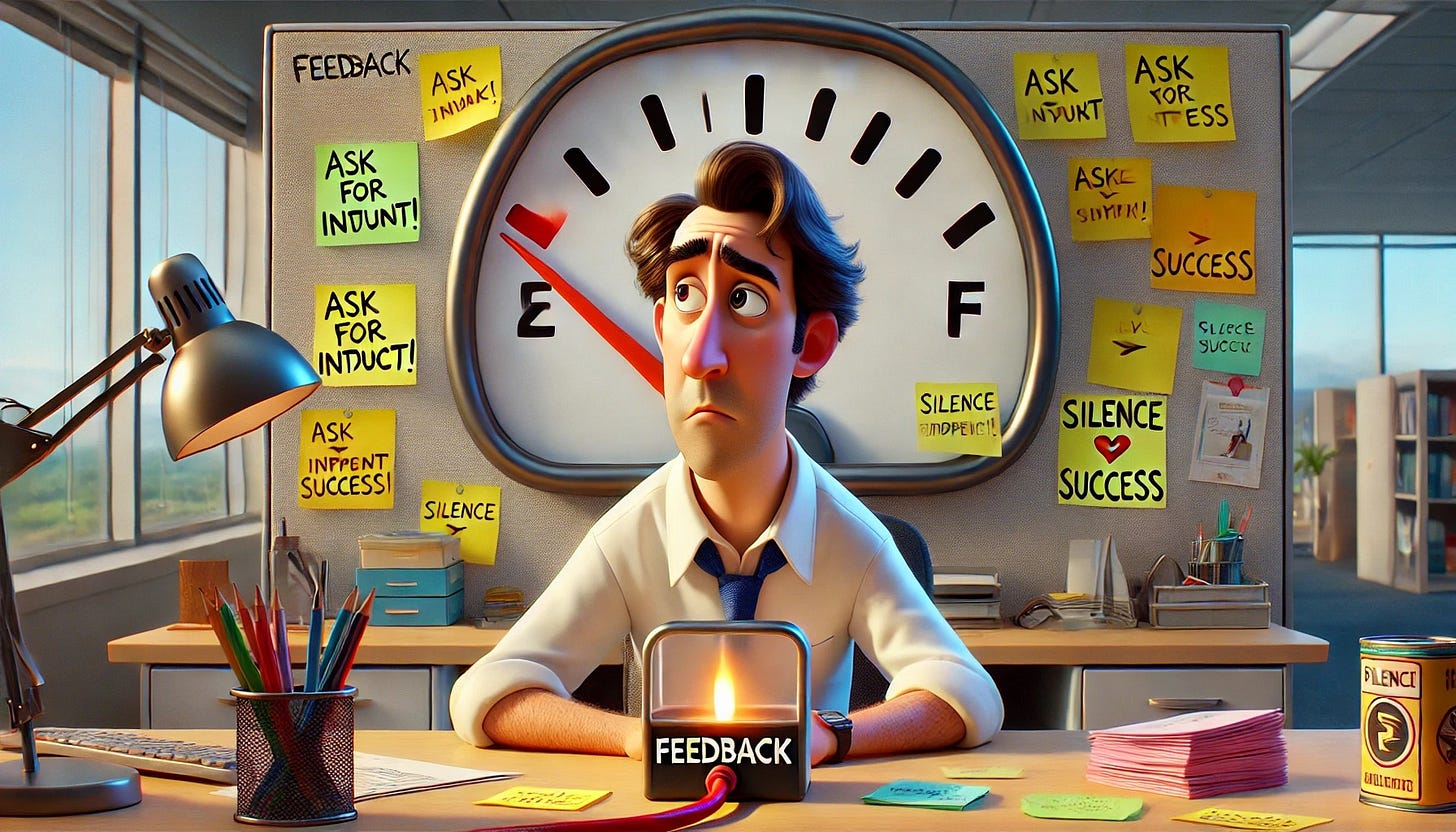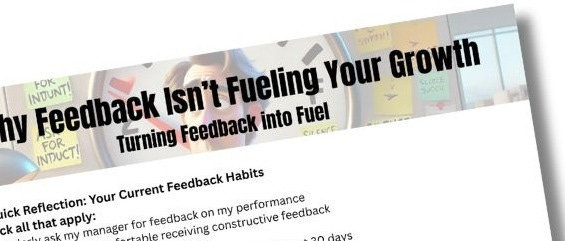Why Feedback Isn’t Fueling Your Growth
"We all need people who will give us feedback. That's how we improve." — Bill Gates.
A talented professional with years of experience finishes a big project. The results are strong, the work was thorough, and the client is happy. They expect praise, maybe even a conversation about the next step in their career. But instead, the response is quiet. A short "good job" and then... nothing.
Weeks go by. No feedback. No opportunity. No promotion.
Here's the twist. The silence isn't about performance. It's about growth. And growth doesn't happen when we avoid feedback. It happens when we seek it out, listen with intention, and use it to evolve.
This is Part 2 of our leadership development series. In Part 1, we talked about the invisible ceiling—the barrier that keeps great employees from being seen as leaders. Today, we're talking about one of the biggest reasons that the ceiling stays in place: feedback and emotional intelligence.
Feedback Isn't Just Helpful. It's Necessary.
Too many emerging leaders miss out on growth because they misunderstand feedback. Some think no news is good news. Others avoid it because they fear criticism. But here's the truth: feedback is how you learn what others really see in you. Without it, you're navigating in the dark.
I struggled with feedback in my early career. I thought that asking for or getting feedback was a sign of weakness, lack of focus, and understanding. I was wrong and lost valuable growth opportunities within my career.
Great leaders don't just receive feedback. They ask for it.
They make it easy for others to be honest. They follow up on it. And they use it to reflect, adjust, and move forward with greater clarity.
If you are serious about becoming a leader, you need to treat feedback like fuel. It will power your growth if you use it well.
Are You Avoiding Feedback?
Let's pause for a quick self-check.
Do any of these sound familiar?
You only ask for feedback during annual reviews
You become defensive when someone gives you a suggestion
You assume silence means you're doing fine
You feel uncomfortable asking a peer or direct report how you're doing
If you nodded to even one, you are likely missing valuable opportunities to grow.
Getting feedback takes humility. Acting on it takes maturity. And both are essential traits in effective leadership. Hello?
Emotional Intelligence: The Missing Ingredient
Feedback on its own isn't enough. You also need the emotional tools to process it in a healthy way. That's where emotional intelligence—or EQ—comes in.
Emotional intelligence is your ability to recognize and manage your own emotions and respond well to the emotions of others. Leaders with strong EQ are great listeners. They stay calm under pressure. They respond instead of react. They know how to give and receive feedback with empathy.
Leaders without EQ? They often seem defensive, impatient, or unaware of how they affect those around them.
You might have the experience and technical skills for leadership. Still, without emotional intelligence, those strengths will only take you so far.
How to Start Asking for Feedback
Not all feedback is created equal. You want feedback that is specific, honest, and focused on behavior you can change.
Here are three simple ways to start:
Ask targeted questions
Instead of saying, "Do you have any feedback for me?" ask, "What is one thing I could have done better during that presentation?"
Create safety for honest responses.
Make it clear you welcome feedback and won't take it personally. Say something like, "I'm trying to grow as a leader, and your feedback will help me."
Follow up and thank them.
Let people know when their feedback helped you. Say, "Thanks for that insight last week. I applied it during my client call, and it worked."
The more you do this, the more others will trust you with the truth. That trust is the foundation of influence, and influence is what leadership is made of.
Build Self-Awareness with Mentorship and Reflection
You can also grow your emotional intelligence by building your self-awareness. This doesn't require a significant time investment, just intention.
Here's how to begin:
Find a mentor who will speak truthfully and give you insights about how you come across. Ask for honest feedback about how you handle stress, lead meetings, or communicate under pressure.
Set aside time each week to reflect. Write down what went well, what didn't, and how you handled situations emotionally. Over time, you will notice patterns that can help you grow.
Use self-assessments. Tools that measure emotional intelligence or feedback styles can reveal blind spots and give you a place to focus.
You can't lead others effectively if you don't understand yourself first. Download our worksheet "Turning Feedback Into Fuel" for thought-provoking questions.
Make Your Move
Before we move into Part 3 next week, take time to complete a feedback or EQ self-assessment. You can find tools like this through BetterUp, LinkedIn Learning, or other professional development platforms.
Even a few questions of honest reflection can shift the way you show up.
Leadership is not about having all the answers. It's about being open, aware, and always learning.
If today's article hit home, take one action. Ask for feedback before the end of the week. Use it to grow, not to shrink.
And don't forget to subscribe to the EXCEL2WIN Leadership Newsletter for more tools and insights based on 45+ years of real-world leadership. It's completely free and delivered straight to your inbox each week.
Join us following Monday for Part 3: Thinking Too Small – The Trap of Tactical Leadership.
There’s a reason Radical Candor by Kim Malone Scott continues to show up in conversations about modern leadership—it’s honest, it’s practical, and it cuts straight to what every leader needs to hear: your success depends on how well you give and receive feedback.
Scott introduces a simple but powerful idea—Care Personally, Challenge Directly. That’s the heart of radical candor. It means you don’t sugarcoat the truth, but you also don’t weaponize it. You show people you value them by being clear, not cruel. For Gen Y and Z professionals who want authentic communication in the workplace, this book is gold.
In Part 2 of our leadership series, Why Feedback Isn’t Fueling Your Growth, we talk about how ignoring feedback or lacking emotional intelligence can stall your career. Radical Candor shows what happens when leaders lean in instead of pulling back. It gives you language, mindset shifts, and real-world examples you can apply immediately, especially in hybrid or fast-paced environments.
If you're serious about leadership growth, this book belongs on your shelf—and in your conversations.
Pick up your copy of Radical Candor today, and while you’re at it, subscribe to the EXCEL2WIN Leadership Newsletter for weekly insights grounded in 45+ years of leadership wisdom.







